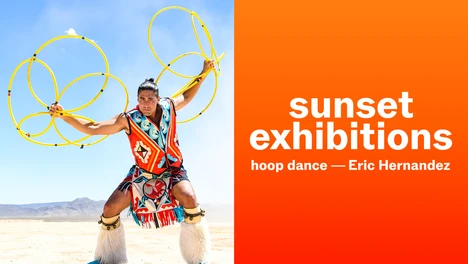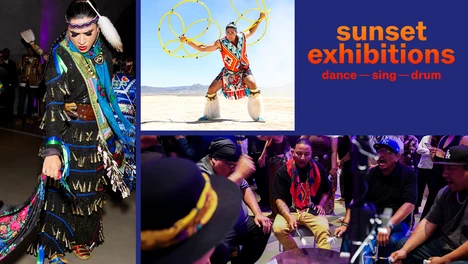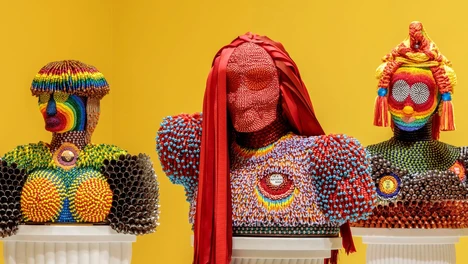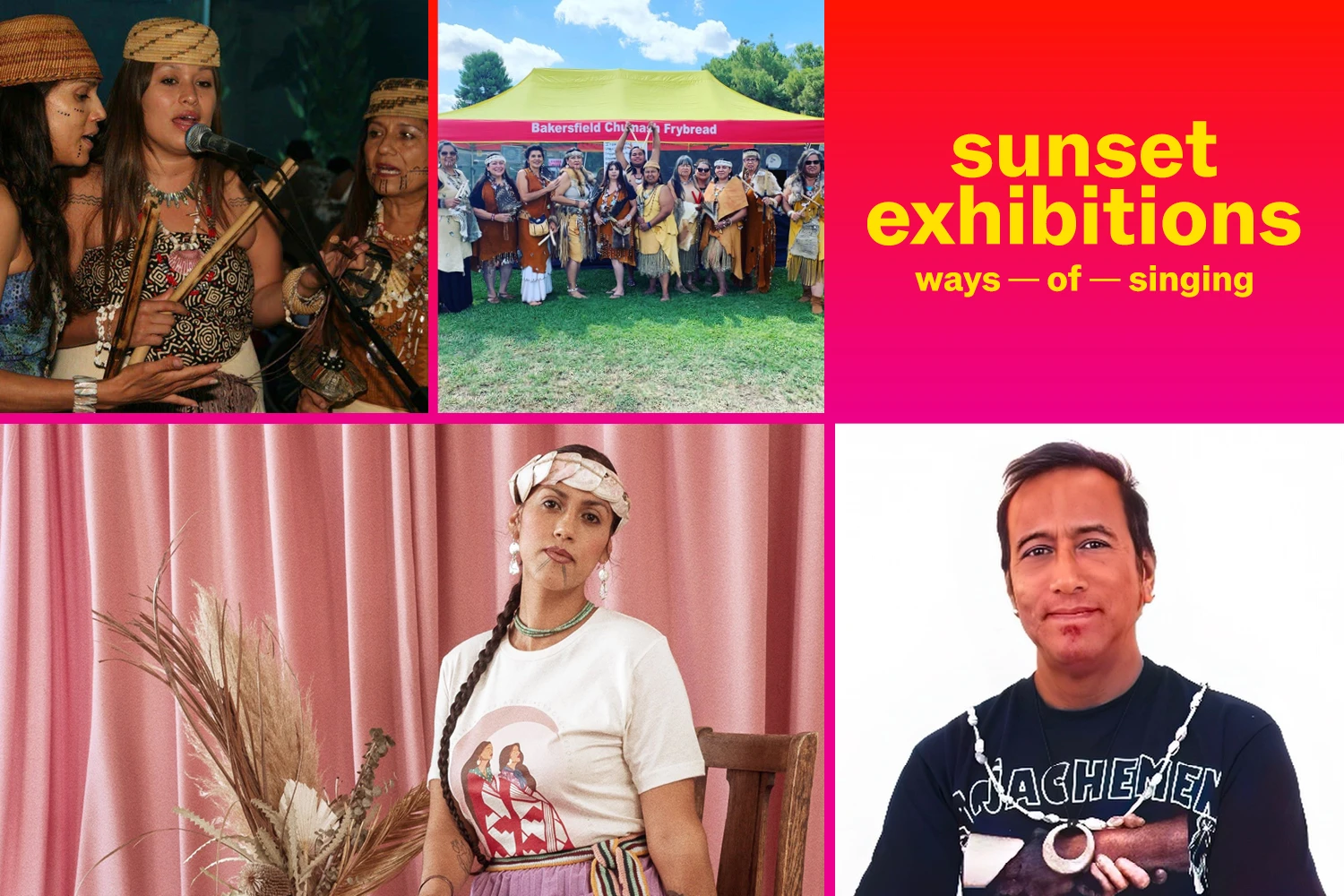
Sunset Exhibitions: Ways of Singing (Sold Out)
Overview
See the special exhibition Jeffrey Gibson: the space in which to place me for free and experience the third and final installment of Sunset Exhibitions, showcasing Toveema, three generations of family of singers Virginia Carmelo, (Gabrielino/Tongva and Digueno/Kumey), Tonantzín Carmelo (creative director), Virginia Arvizu-Sanchez, Paahavet Carmelo, Neshuun Carmelo, and Paveen Carmello Sanchez; retired superior court judge Deborah Sanchez (Chumash, O’odham, and Raramúri) leading The Chumash Dance Sisters; and Jessa Calderon (Chumash and Tongva) employing her hip hop emcee skills as a means of both entertainment and self-healing. Louie Robles (Juaneño Band of Mission Indians, Acjachemen Nation) serves as emcee, weaving the evening together through traditional storytelling.
Sunset Exhibitions at The Broad celebrate the thriving Indigenous and Native cultures abundant in Southern California through vibrant demonstrations of dance, drumming, and singing. These art forms, whether used for storytelling, prayer, or connecting to nature and ancestry, are not only being preserved, but also reinvigorated for contemporary audiences by practitioners today. Presented in conjunction with the special exhibition, Jeffrey Gibson: the space in which to place me, Sunset Exhibitions provide a platform for our robust and varied local Native communities from many parts of the continent to share in the joy of gathering outdoors, honoring history, and acknowledging the present moment as the sun sets over Tovangaar, the original name for The Los Angeles Basin and surrounding areas. The term “Exhibition” is used to differentiate dances and other performances, which are intended for demonstration from Pow Wow dances, which are competitive.
General admission to The Broad is always free. Every Thursday between 5 and 8 pm, Gibson’s exhibition is also free to visit.
Seating is available on a first-come, first-served basis. Designated accessible seating and seating for Native Elders are available. A designated area with mats on the grass is also provided for mobility devices. Feel free to bring pillows and blankets.

All photos courtesy of the artists
Walk-ups are welcome, pending capacity.
Free tickets to this event include same-day access to The Broad, including Jeffrey Gibson: the space in which to place me, and our rotating third floor collection galleries from 5-8 pm. This event is outdoors, and seating is available on a first-come, first-served basis.
Tickets to this event do not include access to Yayoi Kusama’s Infinity Mirror Room—The Souls of Millions of Light Years Away (2013), and must be booked separately.
To learn more and plan your trip, visit Know Before You Go & FAQ. Visitor policies are subject to change.
Sold outSchedule
Biographies
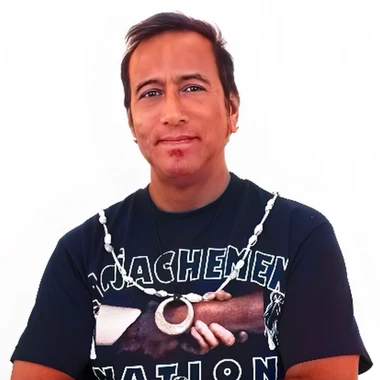
Louie Robles
Louis Paul John Epifano Valenzuela Robles prefers to be called Louie. With over 10 generations of recorded family history in Southern California, his roots run deep in this area. As an enrolled member of the Juaneño Band of Mission Indians, Acjachemen Nation, he can trace his ancestors as being present at the founding of Mission San Juan Capistrano on November 1, 1776. Through his maternal grandmother, Hermina Vasquez Valenzuela’s lineage, he is a direct descendant of two of the original Pobladores, or Settlers, who founded El Pueblo de Nuestra Señora, La Reina de Los Angeles, on September 4, 1781.
Photo courtesy of the artist
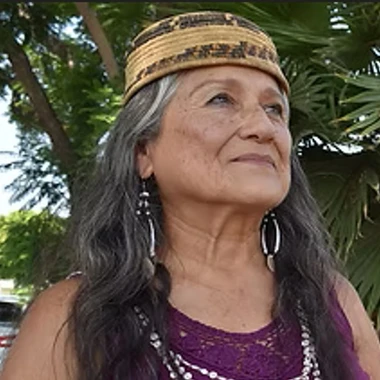
Virginia Carmelo and Toveema
Virginia Carmelo was born in Orange County, California, and raised in Fullerton, California. Her paternal side is California Native American: Gabrielino/Tongva (pronounced Toong–vey) and Digueno/Kumeyaay tribes. In 1974, Virginia received her BA in Ethnic Studies from CSU, Fullerton. During that time, influenced by and involved in the social movements of the sixties, she began her dance studies, which led her to study Indigenous dance with two prominent masters in the Los Angeles area. Virginia was teacher to five of her six children for a 5-year stint of homeschooling. Currently, they take part in preserving and sharing the Tongva culture. The family endeavors to revitalize Tongva tribal song, dance, story, and regalia. Today, the group Toveema can be seen performing both ancient and modern tribal song and dance at many prominent venues throughout Southern California. They take pride in the making of all regalia and instruments, using natural indigenous materials. In 2004, Virginia was led to research the Tongva language. A portion of the tribal language was recorded during the early 1900s and last spoken around 1930. Thanks to linguist Pam Munro and language programs, this California Indian language is being spoken again after 80 years of being silent. From 2001 to 2012, Virginia served as a Tribal Council Member of the Gabrielino/Tongva Nation, the tribe indigenous to the entire Los Angeles Basin. From 2005 to 2010, she served as Tribal Chairperson. Currently, Virginia is a consultant and cultural educator, while also dedicating time to activism and Indigenous dance.
Photo courtesy of the artist
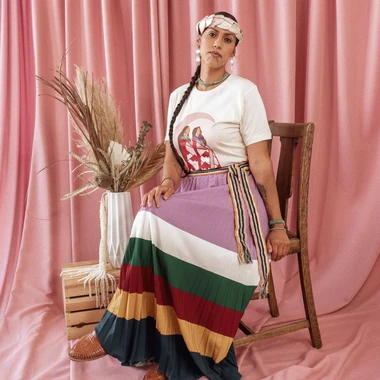
Jessa Calderon
Singer, Songwriter, Emcee (rapper), Poet, Published Author, as well as the Director of Land, Water and Climate Justice for Sacred Places Institute for Indigenous Peoples, Jessa Calderon is of the Chumash and Tongva Nations of Southern California. Jessa also identifies with her Yoeme and Mexican roots. Jessa is a natural-born singer who truly found her voice in hip hop. As an emcee, poet, and published author, Jessa is able to share parts of herself in a way that keeps the crowds intrigued. Not only does Jessa bring pictures to life through the mind’s eye with her writing, she also brings her listeners enlightenment which can offer them the means to encounter self-healing. Since 2019, Jessa has joined the Dream Warriors collective. Together and separately, they share music, culture, stories, poems, seminars, workshops, and webinars, which equate to different means of wellness as individuals and community. Aside from writing and music, Jessa has also been a Massage Therapist & Energy worker for over 20 years. She is passionate in offering Massage, Energy work, Past Life Regressions, Hypnotherapy and Intuitive practices.
Photo courtesy of the artist
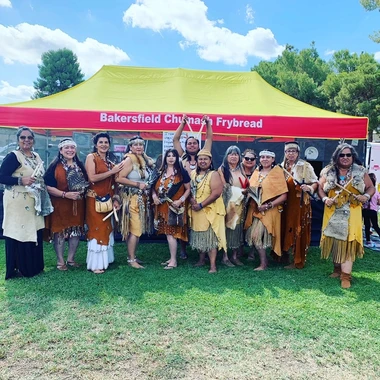
The Chumash Cultural Collective
The Chumash Cultural Collective was formed five years ago. Founded by Deborah Sanchez and 12 of her Šmuwič language students, the Chumash Dance Sisters are housed within the Chumash Cultural Collective. These sisters are also the directors of the collective. Each of these women have been studying the Šmuwič language, which is one of six Chumash languages. Some sisters have been in language classes and studying for more than 10 years. Others more recent. These women are all culture bearers in different capacities, such as song keepers; some have expertise in plants, as food and medicine; regalia and jewelry making; basketry; and song and dance. The overall mission of the collective is to provide cultural sharing, love, and support to Indigenous communities, vulnerable populations, and communities living in diaspora. They focus on educating themselves and educating others through presentations in cultural venues, schools, and as invited guests in other spaces.
The Chumash Dance Sisters have appeared in documentaries discussing language revitalization and reclamation, and climate chaos. Their founder, Deborah Sanchez, is a retired Los Angeles Superior Court judge and is currently pursuing a master’s degree in Linguistics at CSULB. She has been a faculty member for the American Indian Studies program since 2013 and teaches American Indians and the Law.
Deborah Sanchez is the Founder of the Chumash Cultural Collective, a retired Los Angeles Superior Court Judge, and faculty member, American Indian Studies, California State University, Long Beach, since 2013.
Photo courtesy of the artists
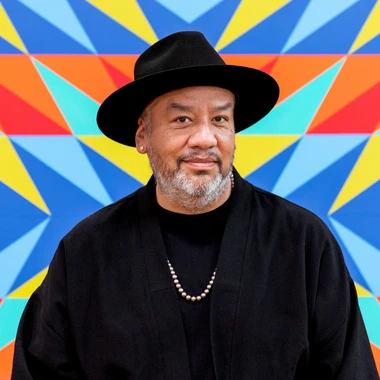
Jeffrey Gibson
Born in Colorado in 1972, interdisciplinary artist Jeffrey Gibson is a member of the Mississippi Band of Choctaw Indians and of Cherokee descent. Gibson received a Bachelor of Fine Arts in painting from the School of the Art Institute of Chicago in 1995 and his Master of Arts in painting from the Royal College of Art, London, in 1998. Throughout his career, Gibson has centered Indigenous and LGBTQ+ perspectives, exploring cultural authenticity, stereotypes of Native people, and how aesthetics circulate amongst different groups. Vibrant colors, geometric patterns and found objects are common throughout his art, resulting in a distinct visual language that celebrates interconnectedness and assemblage.
Photo by Brian Barlow
About Sunset Exhibitions
Sunset Exhibitions at The Broad celebrate the thriving Indigenous and Native cultures abundant in Southern California through vibrant demonstrations of dance, drumming, and singing. These art forms, whether used for storytelling, prayer, or connecting to nature and ancestry, are not only being preserved, but also reinvigorated for contemporary audiences by practitioners today. Sunset Exhibitions provide a platform for our robust and varied local Native communities from many parts of the continent to share in the joy of gathering outdoors, honoring history, and acknowledging the present moment as the sun sets over Tovangaar, the original name for The Los Angeles Basin and surrounding areas. The term “Exhibition” is used to differentiate dances and other performances which are intended for demonstration from Pow Wow dances, which are competitive.
Read More